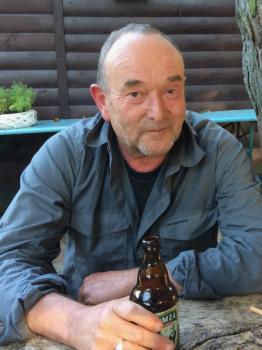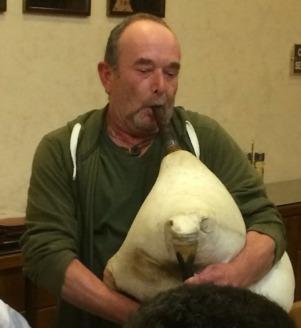The Bagpipe Society
Paddy Shaw Remembered
Frank Vickers

Paddy Shaw died quite suddenly in June, aged 63. He will be greatly missed. Paddy had joined the ceilidh band, Pendragon, as a bass player. At the time, Pendragon were playing a lot of French music and around 1990 they decided to go to the St Chartier festival. Inspired by the sight (and sound) of La Grande Bande des Cornemuses abseiling down the front of the chateau, Paddy bought a set of Jon Swayne's student pipes and then a very fine set of boxwood pipes in D. He soon became a fantastic player and an inspired writer of great tunes.
It was probably that experience of La Grande Bande that started him thinking about doing the Massif Village Orchestra (MVO). Paddy was familiar with a small folk festival in Norwich and somehow or other convinced the then organisers, Mog, Frances Watt and Frank Vickers, to host the first MVO concert.
Paddy never did things by halves (“If you’re going to be a bear, be a grizzly,” he always said). So, lottery money was applied for and awarded, a repertoire was decided and workshops throughout the country were organized. Players were contacted and before long there were about a hundred people up for it. St Andrews Hall, Norwich January 1998 saw the first performance.
Quite a few of the players had never played French folk music, some were new to their instrument and none of them had taken part in an ensemble of this kind before. The repertoire from that event was used by many bands and sessions (and still is today). Many people have been introduced to French folk music from that project. The MVO carried on with performances in subsequent years at Sidmouth, Towersey and Beverley folk festivals and there were more workshops led by members of La Chavannée. Bands were formed as a result too, one of which Xim, included Paddy, Frank Vickers, Nick Carpenter and Kate Ross.
Xim came about from many evenings having to try out the arrangements for the MVO.
Paddy had always been involved in many bands and ensembles in the locality. He played with Roger Eno, Hip Operation, Hot or What, Pendragon and with his brother Robin to name but a few. He had always been in a band (usually several at once). He was a true eclectic, he played in blues bands, jazz bands, rock bands, folk bands and more. His experiences helped him bring things to the arrangements that weren’t standard fare in French folk music.

He had had a varied career, including journalist, recording/sound engineer, teacher and educational specialist. A big part of Paddy’s life has been taken up with birds, in particular swifts. He’s been responsible for several local studies of the swift populations and contributed much to his local birding club, Waveney Bird Club – you can find many tributes to him on their site (https://waveneybirdclub.com/paddy-shaw/).
He leaves his partner Maggie, son Oliver and daughter Rosie and many many friends. He will be greatly missed and in the words of Spike Milligan, “What shall we do now? What shall we do now?”
Paddy Shaw 09/02/1958 – 19/06/2021
Paddy and the MVO – A Retrospective
Ian Clabburn
It is very difficult to put into words the impact of Paddy's talent, infectious enthusiasm and sheer hard work on the UK French dance scene in the late 1990s, with arrival of the MVO. It was an ambitious project that broke new ground in many ways. For a start, there was his vision of a nationwide folk orchestra/big band that was open to all, would learn the material at home and then come together for festival performances. Then there was the repertoire itself – not only did he introduce a number of strong dance tunes to a wider audience, but probably more significantly in the longer term, he also arranged them in parts, scored for different folk instruments, writing some simple but highly effective harmonies along the way. To the best of my knowledge, at the time, no-one else was doing this in either the UK or mainland Europe, where unison playing (Grande Band des Cornemuses) or improvised harmonisation was the norm. All this was achieved when the internet was still in its infancy: the challenges of regular communications with band members, preparing and disseminating the material, including recordings of the music, were massive and its ultimate success relied entirely on the postal service and a small, highly enthusiastic group of friends giving up far more time than they probably ought. It would be so much easier to do nowadays...
Personally, I have many great memories of sheer exhilaration playing in the midst of this wonderful wall of sound at Folkbeat, Kelham, Beverley, Sidmouth and Towersey and the many friendships that came about as a consequence. The tunes and their harmonies have stayed with me and no doubt many other former MVO members and I continue to enjoy playing Paddy's harmonies, many of which have inserted themselves firmly into the common repertoire of the many pipers who enjoy French music. Thank you Paddy for opening up so many musical doors.
To learn more about the MVO story, you can read Paddy's articles (and one of mine) in the following back issues of the Society's newsletters: May 1996
p10-11, May 1997 p16, Winter 1997 p6-10, Summer 1998 p37, Spring 1999 p13-19
(all are available in the Chanter archive on the Bagpipe Society website).
- Data Processing Notice (GDPR)
-
@BagpipeSociety on X (formally known as Twitter)
-
TheBagpipeSociety on Instagram
-
 BagpipeSociety on Facebook
BagpipeSociety on Facebook
Something wrong or missing from this page? Let us know!
